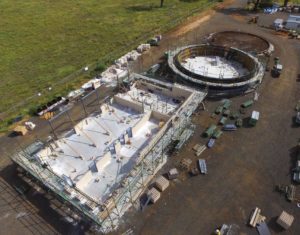Buffalo Stopped Fluoridating Its Water Seven Years Ago To Avoid Risk Of Lead Poisoning

In the wake of the Flint, Michigan water disaster of 2014 in which many people were poisoned by lead from plumbing that was exposed to improperly treated corrosive water from the Flint River, the City of Buffalo discontinued its water fluoridation program, according to a report in the Buffalo News.
The paper reported, “Buffalo Water Board officials say they were in the process of upgrading an outdated fluoride system when the lead water crisis in Flint, Mich. caused them to pause in 2016 and study whether the new type of fluoride system would have a corrosive effect on Buffalo’s many lead pipes. They say studies showed the system is safe and city will begin adding fluoride to its water again sometime in 2023.”
“Out of an abundance of caution, we placed this project on hold while we further studied this treatment change, [Water Board Chairman OJ] McFoy said. “We’re very methodical. We don’t want to screw anything up. We wanted to make sure nothing like that happened in Buffalo,” the paper reported.
The risk of lead poisoning from fluoridated water supplies has been known for many years, but the cost of such damage is generally not taken into account in statements of alleged cost savings from the fluoridation program.
Researchers Warn Of Environmental Fluoride Contamination From Plaster Board Waste

While it has been known for years that fluoride contaminates the gypsum (calcium sulfate) that is used in wall board or plaster board, researchers from India and Japan have drawn attention to the potential environmental hazard to soil and water from exposure to the toxin during work to recycle the gypsum from board waste.
Writing in Environmental Research December 6 the researchers note, “Plaster board waste generated from industries, usually contains major proportion of calcium as calcium sulfate. In addition, fluoride is remarkably one among the constituents of this waste material which leaches off into the soil and aquatic environments and causes fluoride pollution.”
The authors note that the hazard has been studied extensively in Japan, where large amounts of waste gypsum are generated.
“Every year, the discharge of waste plaster board (PB) is estimated to be 1.091 million tons in Japan. The PB discharge includes about one million tons from demolition works and 0.295 million tons from new construction works. The estimated discharge is expected to reach 2.5 million tons in 30 years,” they write.
“As a consequence of financial crisis to manufacture the gypsum, many companies intend to develop the recycling of waste gypsum boards by heating it to produce gypsum hemihydrate,” they note.
The fluoride contamination is generated during the decomposition of fluoroapatite-containing phosphate rock using sulfuric acid and through the use of fluoride containing coal in the production process.
Fluoride’s presence in gypsum has been known by those studying animal feeds for many years.
In 1965 Israeli scientists S. Hurwitz and N.T. Rand investigated the use of gypsum as a replacement for limestone as an added source of calcium in chicken feed, finding the gypsum was composed of more than 5 percent fluoride, and caused a “marked growth retardation” of the animals.
Sources:
https://doi.org/10.1016/j.envres.2022.115005
https://www.sciencedirect.com/science/article/pii/S0032579119490068
Irish Health Research Board Continues To Find No Evidence Fluoride Can Harm

Ireland’s agency for funding, coordinating and overseeing health research has again expressed no concern over the considerable body of evidence of adverse health effects from fluoridation of drinking water in its new report released in November.
The Republic of Ireland is the only country in Europe that suffers under a national water fluoridation mandate, begun in 1964.
The report, which considered only 37 research reports concluded, “We found no conclusive evidence for a link between community water fluoridation and most conditions we examined for which research was available, including bone health, cancer, kidney stones, birth and infant abnormalities, and death rates. The evidence is generally of low quality and most of the studies included, due to their designs, cannot provide evidence for any causal relationships.”
The report added, “neuropsychological and endocrine outcomes emerged as areas requiring further monitoring. As the existing research in this area is currently limited in scope and interpretation is hampered by methodological problems, further high-quality research is now needed in order to shed light on the impact, if any, of artificial water fluoridation on these aspects of systemic health.”
One of the major health concerns, prenatal fluoride exposure’s neurotoxic effect, was reported more than 30 years ago by Mullenix and others.
Prof. J. Broadbent of New Zealand, a water fluoridation advocate, was employed as an expert consultant for the report.
Five Years Later Australian Town Still Not Fluoridated

A series of problems, including floods, worker shortages and the COVID pandemic, have blocked the construction of the new Gunnedah, Australia water plant and the start of its fluoridation program that was approved by the Shire Council more than five years ago.
“Gunnedah council voted to endorse a recommendation from NSW Health to fluoridate the shire’s water supply at a council meeting in December 2017. The controversial vote came in the wake of months of intense and fierce debate across the shire,” according to a report in the Northern Daily Leader December 19.
In the intervening five years a considerable body of evidence has been produced showing that prenatal and early childhood exposure to fluoride in drinking water increases the risk of damage to childrens’ brains causing a reduction in intelligence as measured in IQ tests.
Gunnedah is a town of 10,000 in the state of New South Wales.
Source: The Northern Daily Leader, December 20, 2022
Massive Anti-fluoridation Archive Shows No Support For “Alt-right Pipeline”

A detailed review and organization of the contents of 10 pallets of documents obtained from the family and friends of the late Houston anti-fluoridation activist Martha Bevis by this author over the past 18 years does not support the recent claim by University of Chicago scholar Kathleen Belew that white supremacist groups have created a “crunchy to alt-right pipeline” that uses opposition to fluoridation as a way to recruit people into the white supremacist movement.
In her essay, published December 14 on The Atlantic website, Belew uses the flippant term “crunchy” to refer to the “natural-food-and-body community.”
“These bits of crunchiness included organic farming, a macrobiotic diet, neo-paganism, anti-fluoridation, and traditional midwifery. All of these are often thought of as leftist or “hippie” issues,” she writes.
Bevis was a central figure in grassroots organizing across the USA. The massive collection of documents from 1975 to 2004 includes correspondence with activists in nearly every state, and is largely focused on the marshaling of new scientific evidence, preparations of comments to federal and state agencies, and the recruitment of scientists to testify in local campaigns and lawsuits.
•• Michael Dolan can be contacted at <mdolan.ecsn@outlook.com>
•• The archives of The Fluoridation Review are available at: https://
